Banning rickshaws may not be the big traffic solution

It is the number one complaint among social media users in Dhaka's traffic forums, and also one of the first solutions suggested by the masses when asked what could fix the anarchy on our roads. Going by internet discourse, it seems that rickshaws—Dhaka's trusty old three-wheeled friend—have lost the love of its citizens, at least those in cars.
By itself, this brewing sentiment would have been meaningless. But last week, Road Transport and Bridges Minister Obaidul Quader directed the authorities concerned to take steps to stop battery-run rickshaws from operating in the capital, lending credence to the view that rickshaws must go if the roads are to get safer and more efficient.
But how true is that? There must be a reason why rickshaws exist today and have existed for so many years.
While battery-run rickshaws present more extreme versions of the same problems thrown up by an abundance of their pedal-run brethren in Dhaka, it's useful to consider them together when trying to understand what purpose they serve. The reason a ban on rickshaws on the main roads imposed in 2019 didn't survive post-pandemic and two bans on battery-run rickshaws in 2014 and 2021 were never really implemented is because, at the end of the day, rickshaws form a crucial link in the transportation hierarchy of Dhaka.
The transportation system in a busy metropolis like our capital is supposed to be made up of various parts, with public transportation like the metro system serving long-distance commutes, buses serving medium-distance travel or low-cost alternatives for long-distance travel, and walking and cycling being the medium of last mile delivery, taking people to and from their homes and destinations. If all of these components worked like they were supposed to, the roads would be empty enough for those in private cars and motorcycles to travel—with relative ease—distances that demand motor vehicles. However, this is not even close to the ground reality.
Banning rickshaws in Dhaka is an easy solution to a difficult problem, but Dhaka's traffic is a complicated problem that needs multifaceted efforts to combat it. Rickshaws have been around for nearly a century, thus trying to get rid of them overnight is a rash and unwise course of action. Battery-run rickshaws pose a significant safety threat, so standardising these vehicles to make them safer and issuing licences for rickshaw pullers can be a more deliberative first step, until viable alternatives are presented.
The metro system in Dhaka is in its early days. Buses here are dysfunctional and extremely uncomfortable; they don't go everywhere, and when they do go somewhere, they go very slow. Cycling on major roads is risky given the lack of cycling lanes and other cycling infrastructure, and walking is difficult due to the dilapidated state of footpaths. People have reacted to this status quo in whichever way possible for them: those who can afford motor vehicles buy cars and motorcycles (or use ride-sharing services), and those who can't afford them are left to fight it out with the options remaining to them. Rickshaws are one of these options, and a particularly popular one at that.
A significant segment of Dhaka residents are people who can't afford cars, but for whom cheap bus travel is not appealing either. These are people who typically travel shorter distances, and they would rather spend some extra money on a rickshaw than expose themselves to the horrors of Dhaka's public transportation. If our footpaths were wide and flat, shaded and clean, then maybe these trips would be made on foot. If wide footpaths were paired with safe cycling lanes, walking and cycling could replace Dhaka's rickshaws altogether.
The problem with banning a mode of transportation without creating suitable alternatives is that the demand for transportation isn't something that just goes away. People need to get places, and when their preferred, or in many cases, only mode of transportation is taken away from them, whether or not it is banned or illegal does not matter. Rickshaw owners know this well, which is why when the previous bans were announced, they did not shy away from flouting the rules. The number of rickshaws in Dhaka's roads may go up or down, but there is hardly a place in our city where rickshaws are never seen.
So, what is the outlook for the future? Will Dhaka be forever inundated with rickshaws? Are motorists in this city bound for eternity to match the speed of a rickshaw blocking an exit?
The answer is yes, if rickshaws are forever viewed as a problem in isolation and not as a part of a problem-stricken transportation ecosystem. If rickshaws must go, something must come and replace them. This something needs to be better in terms of speed, comfort, and cost. Considering the fact that Dhaka's neighbourhoods are anything but homogenous, these solutions must be formulated on a case-by-case basis. What is the reason behind battery-run rickshaws being abundant in Uttara and parts of Mirpur, while in most other neighbourhoods, they only come out at night? If rickshaws primarily serve as a method of travel within a certain area, then the replacement for rickshaws in that area must consider the population and size of the neighbourhood, consider whether the dominant class of residents is families with school-going children or younger professionals. If the roads in an area are so narrow that only rickshaws can use them, then banning rickshaws would mean reorganising the area in such a way that all essential services are accessible on foot.
Beyond traffic and city-planning challenges, there is an economic challenge to banning rickshaws in Dhaka as well. According to a report in this daily, there are over 11 lakh pedal rickshaws in Dhaka, registered and unregistered. These rickshaws sustain the livelihoods of millions of rickshaw pullers and rickshaw mechanics, who in turn contribute over Tk 30,000 crore to the rural economy of Bangladesh every year. The prospective unemployment of such a large number of individuals cannot be taken lightly, and if any rickshaw bans are enacted, the gradual rehabilitation of rickshaw pullers into productive and long-term employment must be a part of the process.
Banning rickshaws in Dhaka is an easy solution to a difficult problem, but Dhaka's traffic is a complicated problem that needs multifaceted efforts to combat it. Rickshaws have been around for nearly a century, thus trying to get rid of them overnight is a rash and unwise course of action. Battery-run rickshaws pose a significant safety threat, so standardising these vehicles to make them safer and issuing licences for rickshaw pullers can be a more deliberative first step, until viable alternatives are presented. The illegal power consumption by battery-run rickshaws must be curbed—not by cutting them off from electricity, but by creating legal options for charging, and making sure that only registered rickshaws and licensed rickshaw pullers can access these legal, possibly cheap, charging options. Enforcement of traffic rules on the roads is paramount, not just for rickshaws, but for cars, buses, trucks, and all other forms of transportation.
If rickshaws are to be banned anywhere, analysing the routes where they are most common and deploying cheap, environment-friendly alternatives are a must-do. If a functional transportation hierarchy is established, demand for rickshaws within that system will slowly shrink anyway. But forcefully creating a vacuum in the amount of transportation options available to the public will only invite more anarchy, something that is in ample supply on Dhaka's roads already.
Azmin Azran is digital features coordinator at The Daily Star.
Views expressed in this article are the author's own.
Follow The Daily Star Opinion on Facebook for the latest opinions, commentaries and analyses by experts and professionals. To contribute your article or letter to The Daily Star Opinion, see our guidelines for submission.

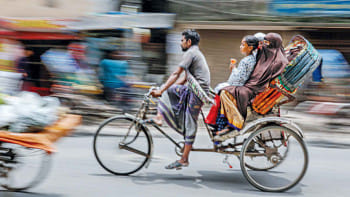
 For all latest news, follow The Daily Star's Google News channel.
For all latest news, follow The Daily Star's Google News channel. 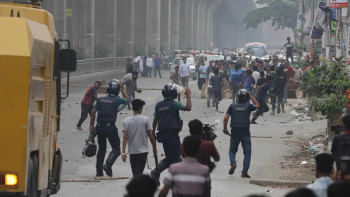







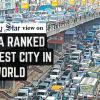
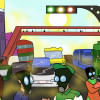
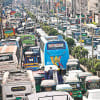



Comments